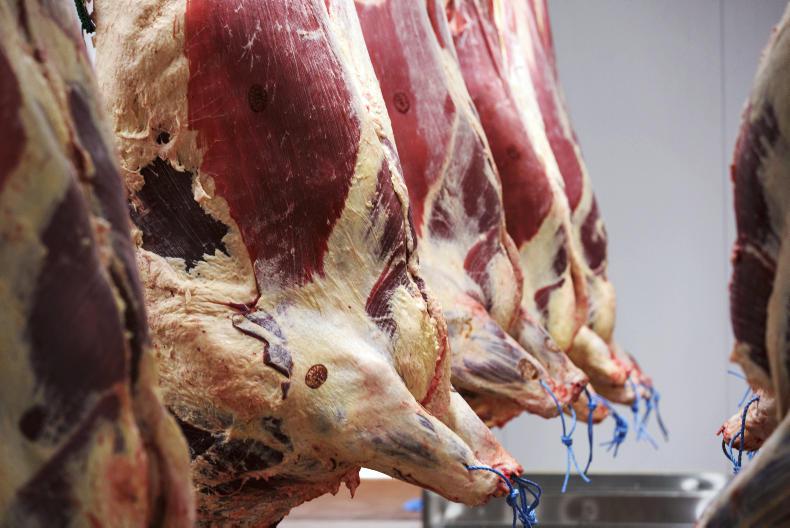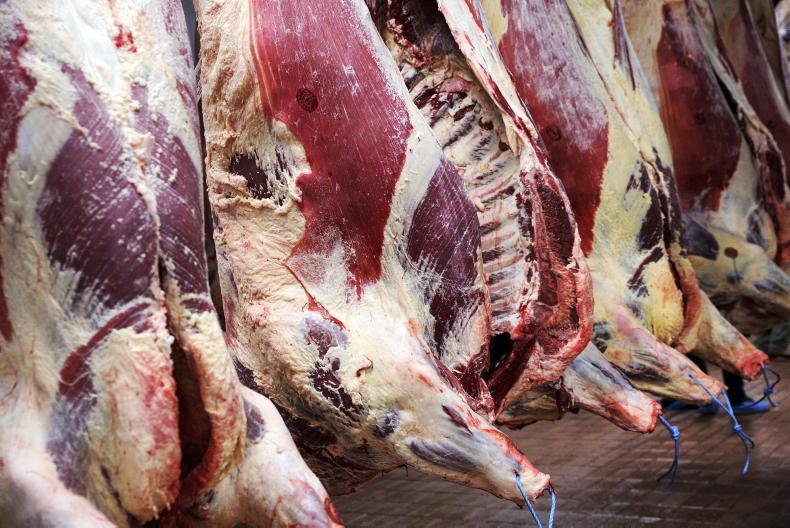The mood in the beef trade continues to be dominated by delays in getting cattle accepted for slaughter. There are varying reports on how the situation differs between plants.
The common theme is that most plants are significantly curtailing the number of over-30-month cattle they handle. But all cattle are facing an element of a delay due to volumes in the system.
Producers with a mixture of under- and over-30 months cattle are having some success in getting cattle moved.
But producers who kill in different plants and have overage cattle which are also likely to have gone overweight as a result of the backlog developing during beef factory protests continue to face an uphill challenge.
The focus on under-30-month cattle has also intensified in some plants looking to handle greater numbers for the Chinese market.
The hope for producers caught up in delays is that supplies of under-30-month steers start to tighten due to the spring-calving profile of the national herd forcing factories to handle higher numbers of cattle currently deemed less desirable.
Greater appetite as factories start to fill orders for the Christmas trade should hopefully boost demand.
Quotes are largely unchanged. The average base quote for steers is €3.45/kg, with heifers on a base of €3.50/kg. Some plants continue to try to bring heifers back to a base of €3.45/kg, while Liffey Meats is reported as quoting a base of €3.55/kg for heifers.
Cow prices have come under pressure in some plants. The general quote is €2.60/kg for P+3 grades, €2.80/kg for O grades and €3.00/kg for R grades.
Some plants are trying to bring O and R grading cows back 5c/kg to 10c/kg. At the top of the market, 5c/kg to 10c/kg higher has been paid to dealers and agents handling large numbers. This is reflected in the Department of Agriculture reported price tables.
Bulls are trading in the main from €3.40/kg to €3.45/kg for R grades, with U grades ranging from €3.50/kg to €3.55/kg.
O grades are meeting a wider differential, with prices ranging from €3.15/kg to €3.30/kg. Bulls less than 16 months and trading on the grid are selling on a base of €3.40/kg to €3.45/kg. It remains important for producers to clarify weight limits and potential deductions before moving bulls.
Last week’s kill was recorded at 34,388 head. This is the first week since early August where weekly throughput exceeded comparable weekly levels in 2018. The first week of November in 2018 started a five-week period where the beef kill averaged over 40,000 head.
Tighter NI supplies
A tightening in supplies in Northern Ireland is adding more life to the trade. Quotes have increased from a range of £3.12/kg to £3.20/kg (€3.62/kg to €3.71/kg excl VAT) a week to 10 days ago to £3.16/kg to £3.20/kg this week, with plants trying to limit upward movement at higher prices across the board.
Producers with greater negotiating power are having much more success in exceeding the £3.20/kg mark. Top returns are rising to the high-£3.20s for steers, with choice heifers rising into the low- to mid-£3.30s.
LMC’s latest market bulletin highlights APHIS numbers to show the extent of tighter supplies.
There were 78,861 beef-sired males in the 18- to 24-month age bracket on farms in October 2019, a decrease of 6.2% year on year. Beef-sired females, at 95,536, were 5.4% lower, while dairy-sired males, at 10,227 head, were 6.6% lower.
Read more
NI trends: beef prices on the rise; lamb quotes increasing
The mood in the beef trade continues to be dominated by delays in getting cattle accepted for slaughter. There are varying reports on how the situation differs between plants.
The common theme is that most plants are significantly curtailing the number of over-30-month cattle they handle. But all cattle are facing an element of a delay due to volumes in the system.
Producers with a mixture of under- and over-30 months cattle are having some success in getting cattle moved.
But producers who kill in different plants and have overage cattle which are also likely to have gone overweight as a result of the backlog developing during beef factory protests continue to face an uphill challenge.
The focus on under-30-month cattle has also intensified in some plants looking to handle greater numbers for the Chinese market.
The hope for producers caught up in delays is that supplies of under-30-month steers start to tighten due to the spring-calving profile of the national herd forcing factories to handle higher numbers of cattle currently deemed less desirable.
Greater appetite as factories start to fill orders for the Christmas trade should hopefully boost demand.
Quotes are largely unchanged. The average base quote for steers is €3.45/kg, with heifers on a base of €3.50/kg. Some plants continue to try to bring heifers back to a base of €3.45/kg, while Liffey Meats is reported as quoting a base of €3.55/kg for heifers.
Cow prices have come under pressure in some plants. The general quote is €2.60/kg for P+3 grades, €2.80/kg for O grades and €3.00/kg for R grades.
Some plants are trying to bring O and R grading cows back 5c/kg to 10c/kg. At the top of the market, 5c/kg to 10c/kg higher has been paid to dealers and agents handling large numbers. This is reflected in the Department of Agriculture reported price tables.
Bulls are trading in the main from €3.40/kg to €3.45/kg for R grades, with U grades ranging from €3.50/kg to €3.55/kg.
O grades are meeting a wider differential, with prices ranging from €3.15/kg to €3.30/kg. Bulls less than 16 months and trading on the grid are selling on a base of €3.40/kg to €3.45/kg. It remains important for producers to clarify weight limits and potential deductions before moving bulls.
Last week’s kill was recorded at 34,388 head. This is the first week since early August where weekly throughput exceeded comparable weekly levels in 2018. The first week of November in 2018 started a five-week period where the beef kill averaged over 40,000 head.
Tighter NI supplies
A tightening in supplies in Northern Ireland is adding more life to the trade. Quotes have increased from a range of £3.12/kg to £3.20/kg (€3.62/kg to €3.71/kg excl VAT) a week to 10 days ago to £3.16/kg to £3.20/kg this week, with plants trying to limit upward movement at higher prices across the board.
Producers with greater negotiating power are having much more success in exceeding the £3.20/kg mark. Top returns are rising to the high-£3.20s for steers, with choice heifers rising into the low- to mid-£3.30s.
LMC’s latest market bulletin highlights APHIS numbers to show the extent of tighter supplies.
There were 78,861 beef-sired males in the 18- to 24-month age bracket on farms in October 2019, a decrease of 6.2% year on year. Beef-sired females, at 95,536, were 5.4% lower, while dairy-sired males, at 10,227 head, were 6.6% lower.
Read more
NI trends: beef prices on the rise; lamb quotes increasing










SHARING OPTIONS